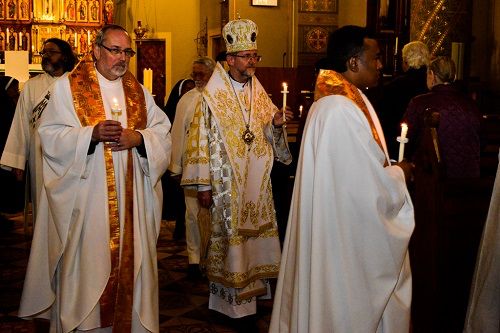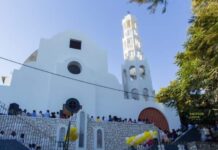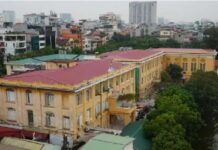(Vienna, Austria) Redemptorist bishop Bohdan Dyzurakh CSsR conducted the 64th city pilgrimage to Our Mother of Perpetual Help on October 27 in the Marian church of the Redemptorists in Hernals, Vienna. In his homily, he recalled the war situation in Ukraine, the incredible endurance and the long-lasting hope in most of the people, as well as his many meetings with the refugees in Germany, where he works as the exarch for the Ukrainian Catholic Church of the Byzantine Rite. The bishop also thanked for the great solidarity from various parishes, associations and the Redemptorists in Vienna.

During his visit, he was also interviewed about current issues and questions. The interview was conducted by Fr. Lorenz Voith, CSsR, Rector of the Redemptorist community of Vienna-Hernals.
Dear Bishop, there is a war in Ukraine. How are the people in Ukraine facing it, with the terror, the attacks, the expulsion, and so many restrictions?
Bishop Bohdan Dyzurakh CSsR: Ukraine is going through the most difficult and decisive period in its recent history. What is at stake is nothing less than our existence as people and as an independent nation. The situation in our homeland is dramatic, but we do not lose hope. Our people show great courage and determination in defending their freedom and securing a dignified future for the next generations. Ukrainians are willing to pay the highest price of their own lives for freedom, justice and dignity. They prove this every day, thereby attracting the attention and respect of all civilized humankind.
What does Ukraine particularly need in these months? From where does the country expect help? How do you see the solidarity of Western Europe with Ukraine?
Bishop: In September and October, large areas in the east of the country were liberated from the occupant. The people over there are in dire need regarding food and medical care. We are facing the most challenging winter since world war II, as Russia is deliberately and systematically destroying civilian infrastructure to prevent the functioning of the Ukrainian economy and forcing the people to freeze to death in the coming months. It is an aggressive policy that shows the signs of genocide, of mass killing. On a human and personal level, we will also have to overcome deep emotional trauma in the coming months and years.
Is there a chance that the war will come to an end soon? Do we need peace mediators from outside?
Bishop: The war will be over one day for sure, but until then, a lot of suffering will be inflicted on innocent people because Putin’s regime is not showing even the slightest sign of stopping the aggression. On the contrary, many experts are convinced that Putin will use every offer to negotiate to legitimize his previous conquests on Ukrainian territory and then immediately prepare his army and people for further escalation. It is easy to find the pretext for this, be it from the threat of the cold winter, nuclear weapons, or a “dirty bomb”. One should see and understand it clearly because the naivety of western politicians and their attempts to appease the dictator are costing us so enormous.
Therefore, before starting the negotiations, it is necessary to formulate the basic principles so that it is made clear to the aggressor from the start that the international order in question and the fundamental rights of people and humankind is neither tolerated nor ignored. If clear and fair principles are agreed upon, then it will not be a matter of who would take up the initiative as the mediator on the part of the international community.
How do you see your present challenges in the Greek-Catholic-Ukrainian Church in the areas of your responsibility in Germany and Scandinavia?
Bishop: At my installation as bishop, I sent an “SMS” to all the faithful, in which I expressed my view of the tasks of both the exarch and our entire Church in Germany and Scandinavia as well. The “SMS” referred to the first letters of the Ukrainian verbs слухати-молитися-служити (Sluchaty-Molytysia-Sluzhyty, in translation: listen-pray-serve).
Now is the time to listen. This month we are in the midst of the process of listening: the meetings at the parish and deanery level follow one after the other, where, together with the priests and lay people, we try in prayer and exchange of views, to recognize how our pastoral involvement looks like at the moment, what God is calling us to do in today’s circumstances, what priorities should we put forward etc. Ultimately, the main purpose of our existence and our pastoral care point to the inner nature of the Church and its mission in this world, which consists of three tasks: kerygma – the proclamation of the Word of God; liturgy – prayer and the sacraments; diakonia – service to fellow human beings.
What else do you want to tell us more about? Do you have a request or wish?
Bishop: I would like to end by expressing my feelings and my wishes in three words: thanks – perseverance – prayer.
Firstly, I would like to express deep and heartfelt gratitude to all the sisters and brothers in faith and all people of good will here in the west and especially in Austria for their solidarity with us at this time. Your concern, support and your hospitality move and touch our hearts. Therefore, with a grateful heart, a big thank you to all!
Secondly, I invite you all to prepare and set out for a journey together since only together and with everyone’s contribution can we overcome the consequences of this war.
The last and most important thing: prayer! – For those who are suffering, for those affected, but also for the attackers, – praying for God’s mercy and God’s blessing for all of us. “Because every war represents a failure of mankind” (St. John Paul II), the future peace and reconciliation in Europe will be a valuable achievement for and of all.
Bishop Bohdan Dyzurakh was born in 1967 in a village about 60 km south of Lviv. At the end of the 1980s, he contacted the Greek Catholic Ukrainian church, which had been rebuilt from the underground. He began studying theology and was ordained a priest in 1991. That same year he entered the Redemptorist novitiate. This was followed by his higher studies in Strasbourg, Innsbruck and Rome, as well as in Poland, where he received his doctorate in 2000. In Innsbruck, he was in charge of the Redemptorist students from Ukraine for several years. He completed another degree at the Oriental Institute in Rome in 2005 and returned to Ukraine. He was ordained as the auxiliary bishop of the archdiocese of Kyiv in 2006, along with cardinal Husar. In Kyiv, he also headed the curia and was responsible for the synod of the Church. On February 18, 2021, Bishop Bohdan was appointed by Pope Francis as apostolic exarch for the Ukrainians of the Byzantine rite in Germany and Scandinavia. The bishop is stationed in Munich.
On October 28, 2022, bishop Bohdan was elected president of the commission for social pastoral care in the European bishops’ conference CCEE. He is thus entrusted with new tasks at the level of the European Church.







